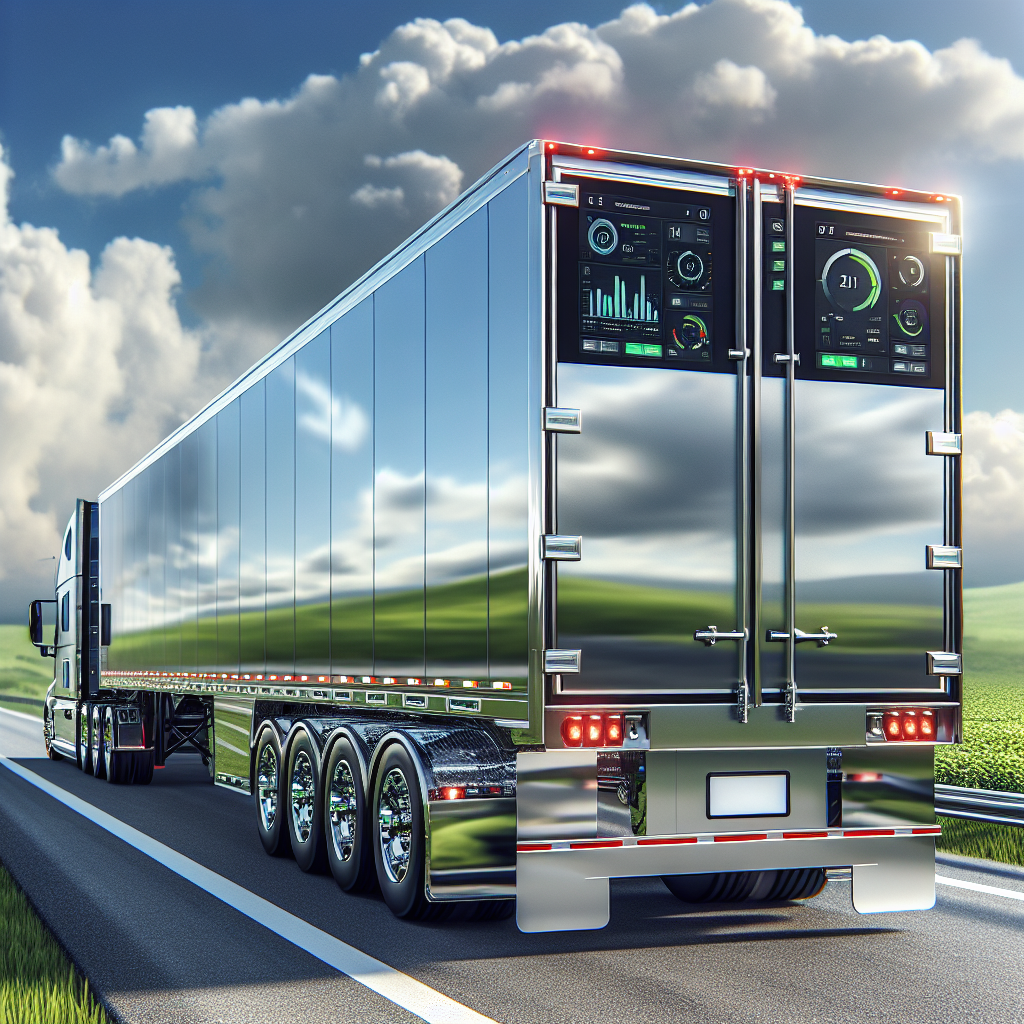In the world of transportation, ensuring the safety of trailers is paramount. A trailer safety system serves as a vital component in maintaining the integrity of cargo and the well-being of those on the road. By monitoring essential parameters such as axle temperature and tire pressure, these systems provide real-time data that can avert potential disasters.
Understanding the importance of these systems begins with recognizing the risks involved in towing a trailer. Overheated axles and under-inflated tires are common causes of trailer-related failures. These issues can lead to catastrophic incidents, including loss of control, costly repairs, and even accidents that jeopardize lives. A reliable trailer safety system can help mitigate these risks by offering:
- Real-Time Monitoring: Constantly tracks vital statistics, alerting drivers to any irregularities.
- Preventative Maintenance: Provides data that can help in scheduling timely maintenance, avoiding unexpected failures.
- Enhanced Performance: Ensures optimal operating conditions, improving fuel efficiency and overall towing experience.
By investing in a smart trailer monitoring system, you not only enhance the safety of your vehicle but also increase the longevity of your trailer. Tow with peace of mind, knowing that trailerwatchdog is standing guard. For more information, visit trailerwatchdog.com.
Key Features of Effective Trailer Safety Systems

When selecting a trailer safety system, understanding its key features is essential for ensuring optimal performance and reliability. An effective system should encompass several critical components designed to enhance safety and efficiency while towing. Here are some of the vital features to consider:
- Axle Temperature Monitoring: This feature helps detect overheating issues before they lead to failure, allowing for timely intervention and repairs.
- Tire Pressure Monitoring: Maintaining proper tire pressure is crucial for safe towing. A good system will alert drivers to any drops in pressure, preventing blowouts and improving fuel efficiency.
- GPS Tracking: Real-time location tracking provides peace of mind, allowing owners to monitor the trailer’s movements and ensuring it remains secure.
- Alerts and Notifications: Instant notifications for any anomalies, such as excessive heat or low tire pressure, empower drivers to take immediate action.
- Data Logging: Comprehensive data logging can help track performance trends over time, assisting in better maintenance scheduling and preventative measures.
By integrating these features, trailer safety systems not only protect the trailer and its contents but also contribute to safer roads for everyone. With the right technology, towing can be a more secure and efficient experience.
How Technology Enhances Trailer Safety Monitoring

In today's fast-paced world, technology plays a pivotal role in enhancing trailer safety monitoring. Innovative advancements enable trailer owners and operators to leverage real-time data, ensuring proactive measures against potential failures. Here’s how technology is transforming the landscape of trailer safety:
- IoT Integration: The Internet of Things (IoT) allows for seamless communication between the trailer's systems and the monitoring platform. Sensors embedded in axles and tires transmit data continuously, providing insights into their conditions at all times.
- Mobile Applications: Many modern trailer safety systems come with dedicated mobile apps that allow users to monitor their trailers from anywhere, receiving alerts directly to their smartphones for immediate action.
- Artificial Intelligence: AI algorithms analyze data patterns over time, predicting potential issues before they occur. This predictive maintenance approach reduces downtime and enhances safety.
- Cloud Computing: Storing data in the cloud ensures that trailer owners can access historical data anytime, facilitating informed decisions regarding maintenance and operation.
- Remote Diagnostics: Advanced systems can conduct self-checks and diagnostics remotely, allowing for swift identification of issues without needing manual inspections.
By harnessing these technological advancements, trailer safety monitoring becomes more comprehensive and effective. This not only reduces the risk of catastrophic failures but also enhances the overall towing experience, making it safer and more reliable.
Best Practices for Maintaining Your Trailer Safety System

To ensure optimal performance and longevity of your trailer safety system, adhering to best practices for maintenance is crucial. Regular upkeep not only safeguards against potential failures but also enhances the overall safety of your trailer. Here are some essential maintenance tips:
- Regular Inspections: Conduct thorough inspections of your trailer at least once a month. Check the condition of tires, brakes, and axles, and ensure that all sensors are functioning correctly.
- Keep Software Updated: Many trailer safety systems come with software that requires periodic updates. Always check for updates to ensure you have the latest features and security enhancements.
- Calibrate Sensors: Regularly calibrate your sensors to maintain accuracy. Misaligned or improperly calibrated sensors can lead to incorrect data readings, potentially compromising safety.
- Monitor Tire Pressure: Maintaining the correct tire pressure is vital for safe towing. Utilize tire pressure monitoring systems (TPMS) to receive real-time data and alerts about any fluctuations.
- Document Maintenance Activities: Keep a detailed log of all maintenance activities performed on your trailer. This helps track the health of your safety system and can be invaluable during inspections or when selling the trailer.
Implementing these best practices will help you maintain a high standard of safety for your trailer, ensuring peace of mind while on the road.
Signs Your Trailer Safety System Needs Attention

Being aware of the indicators that your trailer safety system requires attention is essential for preventing accidents and ensuring the safety of your cargo. Here are some key signs to watch for:
- Frequent Warning Alerts: If your safety system is consistently triggering alerts or notifications, it may indicate a malfunction or underlying issue that needs immediate investigation.
- Inconsistent Data Readings: If you notice discrepancies in temperature or pressure readings, this inconsistency may suggest that sensors are malfunctioning or require recalibration.
- Physical Damage: Inspect your trailer for any visible damage to the safety components, including sensors and wiring. Cracks, frays, or other forms of physical damage can compromise the system's effectiveness.
- Unusual Sounds: Pay attention to any unusual noises coming from the trailer while in motion. Sounds such as grinding or excessive heat can indicate issues with the brakes or axles.
- Increased Wear and Tear: If you notice excessive wear on tires or brakes, it may be a sign that your safety system is not functioning properly, leading to uneven stress on components.
Recognizing these signs early can prevent catastrophic failures and protect both your trailer and the items being transported. Regularly monitoring your trailer's safety system is key to ensuring a safe towing experience.
Future Trends in Trailer Safety Technologies
The landscape of trailer safety technologies is evolving rapidly, with innovations aimed at enhancing safety, efficiency, and performance. As we look to the future, several trends are emerging that promise to revolutionize how trailers are monitored and managed:
- IoT Integration: The Internet of Things (IoT) is set to play a crucial role in trailer safety. Smart sensors will continuously collect and transmit data on tire pressure, axle temperatures, and overall trailer health to a centralized system, allowing for real-time monitoring and alerts.
- Advanced Analytics: With the rise of big data, trailer safety systems will increasingly utilize advanced analytics to predict potential failures before they occur. By analyzing historical data, these systems can identify patterns and provide actionable insights for preventative maintenance.
- Autonomous Features: The future may also see trailers equipped with autonomous features that can assist with braking, steering, and maneuvering. These technologies will help reduce human error and enhance safety during towing.
- Enhanced Communication Systems: Future trailer safety technologies will likely incorporate enhanced communication systems that allow trailers to interact with tow vehicles, providing critical information about their condition and safety status.
- Mobile Applications: User-friendly mobile applications will be developed to give trailer owners instant access to safety data and alerts, enabling them to make informed decisions on the go.
As these technologies advance, they will not only improve safety but also enhance the overall efficiency of trailer operations. Tow with peace of mind, knowing that trailerwatchdog is standing guard with cutting-edge monitoring systems that turn any trailer into a smart trailer.








